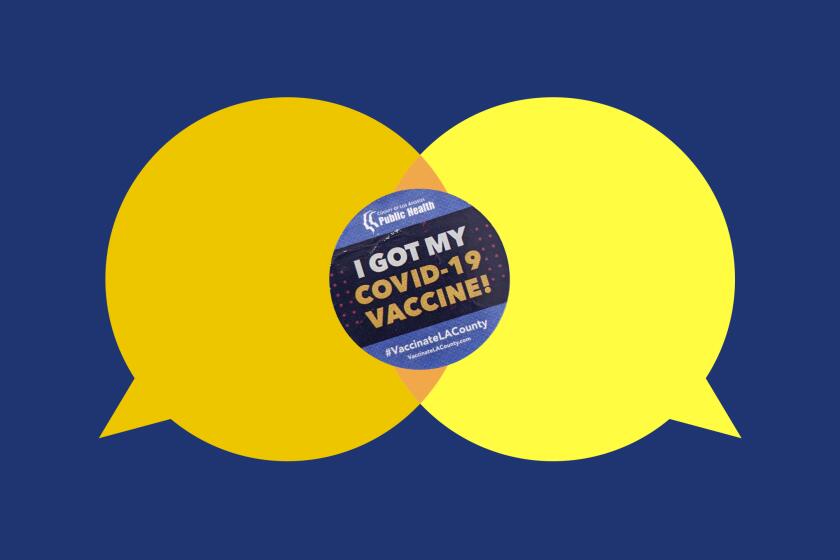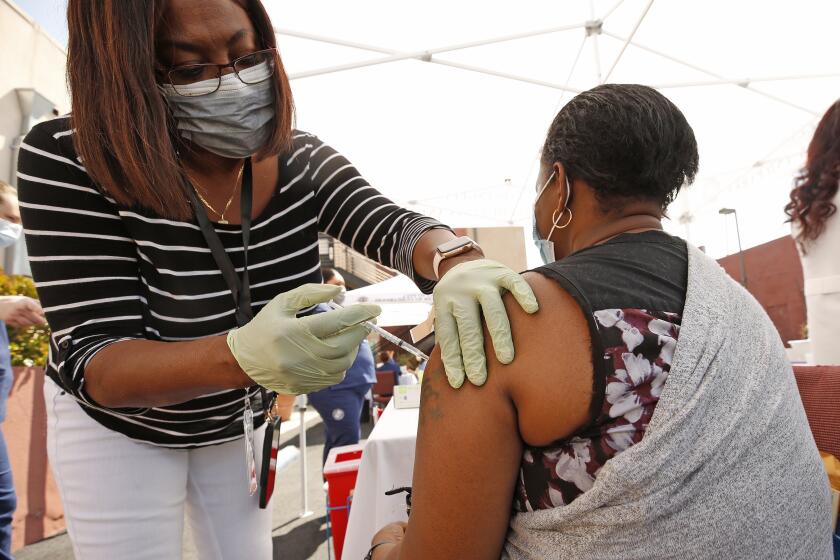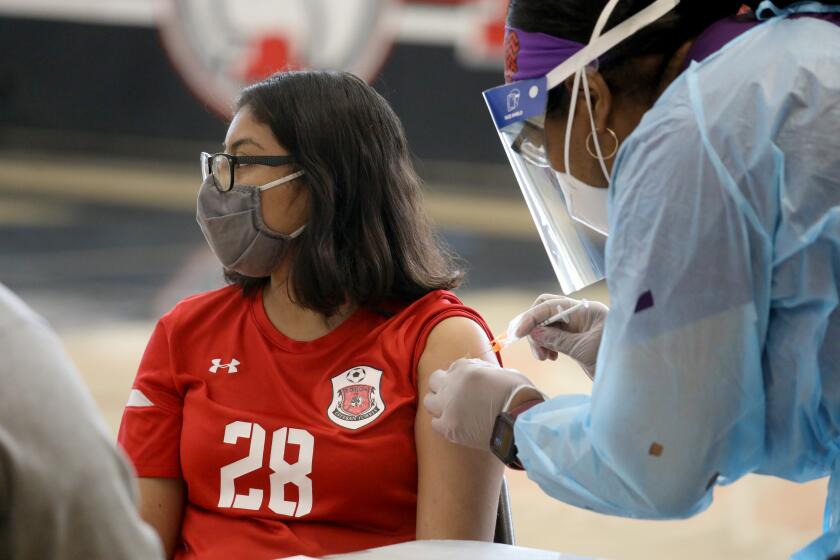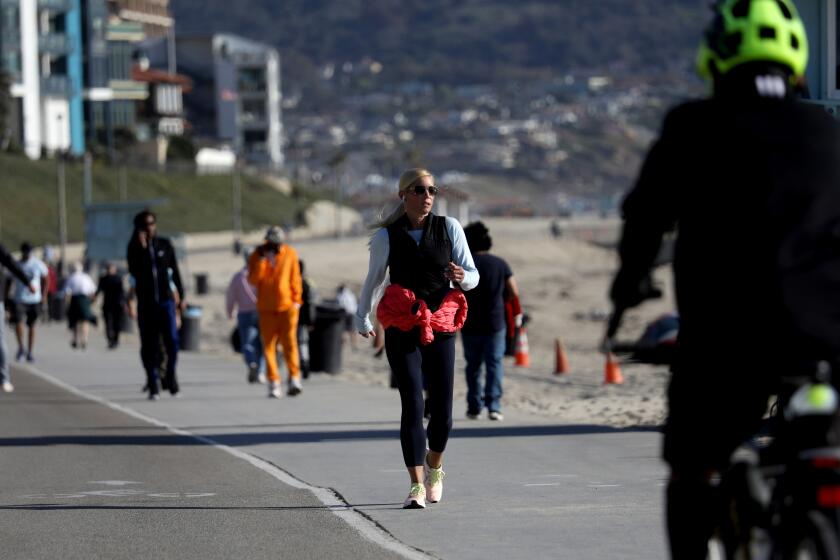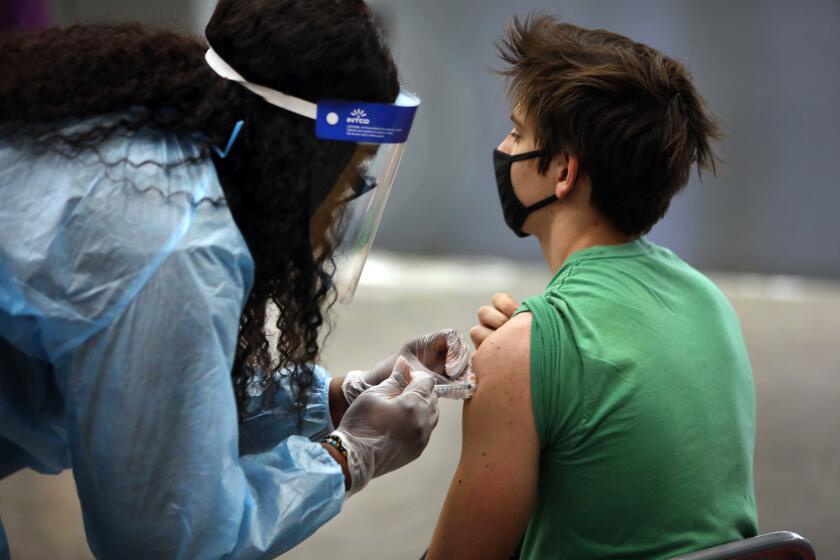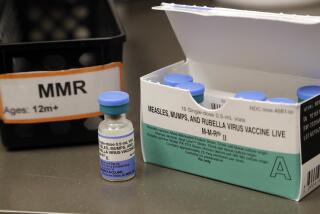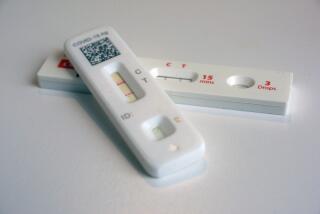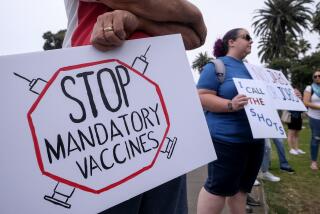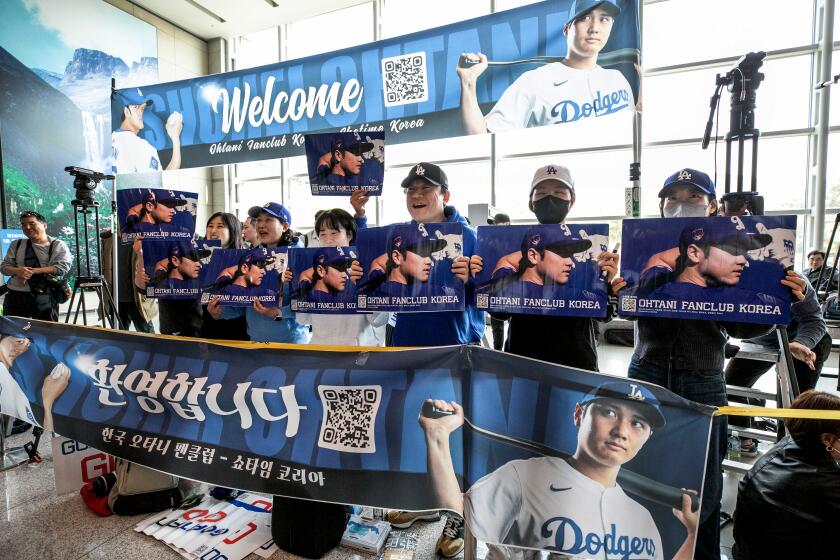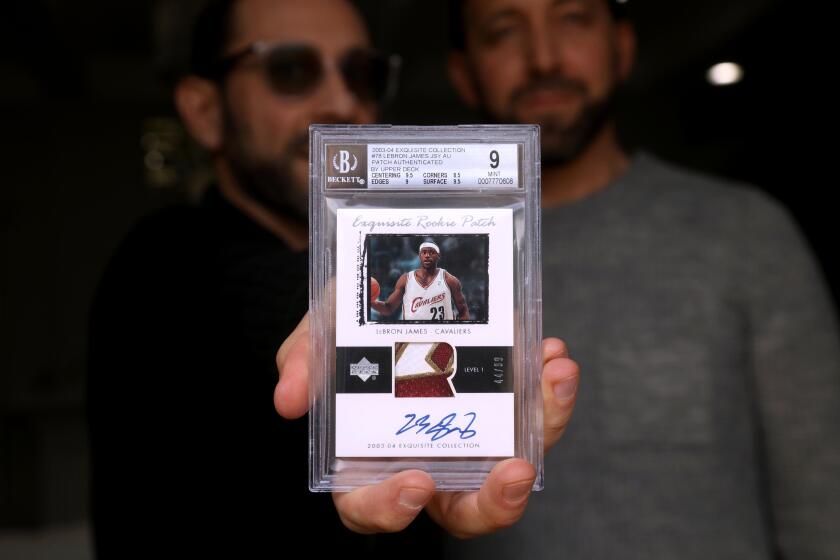My family is divided over COVID-19 vaccinations. Here’s how we cope
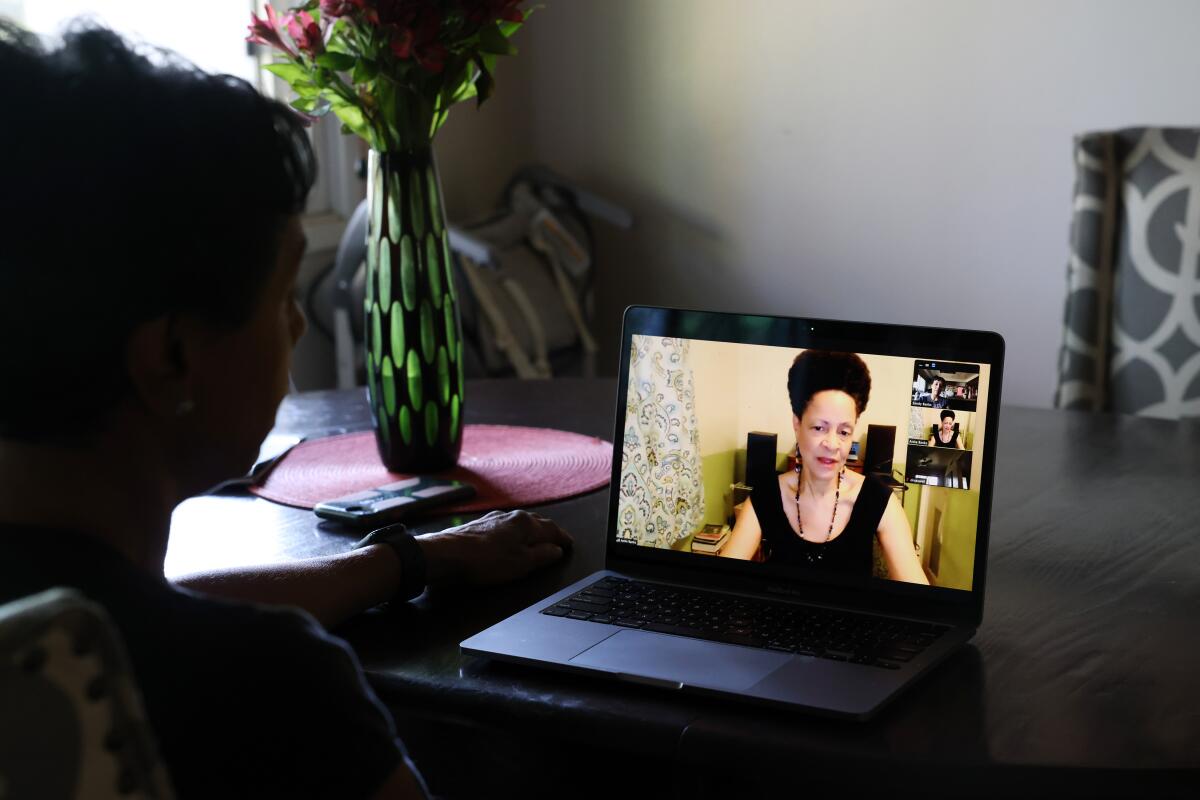
My younger sister and I have a lot in common.
We are both long-winded and gesture dramatically when we speak. We’re patient listeners and inveterate advice-givers. We tilt toward skepticism and cling stubbornly to our beliefs.
And that has brought us to a rare impasse, on the issue of COVID-19 vaccines.
I have been celebrating since February, when I got my first shot of the Moderna vaccine at a San Fernando Valley park. My sister Anita in Cleveland has spent the months since then worrying about me.
Ever since COVID-19 vaccines became a reality, she’s been poring over articles and social media posts about hypothetical harms that most scientists debunk. That left her determined to shun the vaccine — and afraid for me to get my next shot.
You want them to get vaccinated. They don’t. Now what? Tips from experts to have a conversation that could possibly change their mind.
“I love my sister the way she is,” she emailed me three months ago. “And I shudder to think of you having some long-term reaction to this vaccine that could have been avoided. While you are well, I say stay well!”
She followed up with research on natural immune boosters, such as vitamin D. I added that to my health regimen, but refused to even consider skipping my final dose of the vaccine.
“I appreciate the sentiment and respect your skepticism,” I wrote back. “But living here in Los Angeles, I’m more likely to die of COVID than to wind up with some weird vaccine reaction.”
At that point, I hadn’t done the math to know if that was actually true. But my fear of needing a ventilator to breathe was stronger than whatever apprehension I felt about the vaccines.
For my sister, that ratio was reversed. She worried that the new COVID vaccines might turn out, in the long run, to be as dangerous as the disease.
Our email exchange launched a back-and-forth that lasted for months. It was fractious and frustrating at times, because we are tethered to separate echo chambers that amplify our individual views.
But our dialogue also led to heartfelt discussions that have confirmed our sisterly bond — and educated me about the battle that health experts face, as they try to crack the code that will get shots into the arms of vaccine-hesitant folks.
I’ve tried, and failed, to convince my sister with stories of lives lost to COVID-19 and the debilitating symptoms that persist for many who’ve weathered the disease.
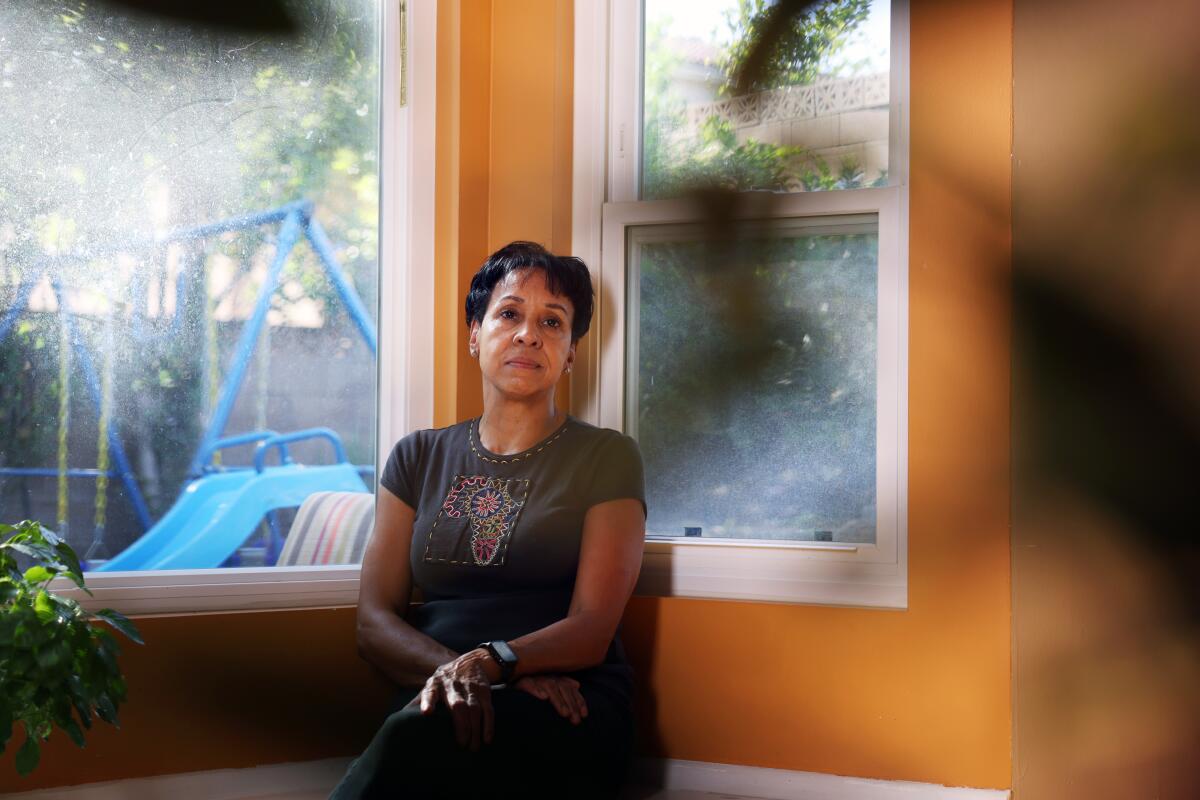
She’s responded with examples that influence her thinking, including a post featuring a young Black doctor who says that people of African descent naturally have stronger immune systems, and suggests the novel vaccines might disrupt that.
It didn’t help my pro-vaccination campaign when the Johnson & Johnson vaccine was temporarily pulled from the market in April after rare and dangerous blood clots were documented in a handful of people among the millions who’d received the vaccines.
My sister and I drew different conclusions from the same set of facts.
To me, the government reaction was a reassuring example of transparency in action: Use of the vaccine was quickly suspended and the problem publicly dissected by medical experts, who deemed it statistically insignificant and allowed vaccinations to resume while studies continue.
But my sister saw the episode as a warning sign, a reflection of potential hazards yet to be detected because of the rush to bring the vaccines to market.
“There are still so many unknown factors,” she told me. And I could not argue with that.
It turns out that after a year of living with COVID-19 fears, my sister and I are both looking for the kind of certainty — a promise of good health — that neither science nor statistics can provide.
**
More than 60% of Los Angeles County residents 16 and older have received at least one shot of a COVID-19 vaccine. And now that 12- to 15-year-olds are able to get theirs, we are inching toward the 80% threshold that county Public Health Director Barbara Ferrer considers a measure of the “herd immunity” needed to stanch the spread of COVID-19.
In fact, Ferrer predicts that such immunity in Los Angeles could be only two months away — if, that is, we can persuade another few million locals to get inoculated.
But the number of vaccines administered each day in Los Angeles has dropped by almost 50% from its high in April.
That requires us to address the resistance of multitudes of vaccine-hesitant people. And we can’t do that unless we’re willing to listen and stop reflexively demonizing them.
Black residents are now twice as likely as Latinos and three times as likely as white and Asian American residents to die from COVID-19.
We’ve tended to lump the so-called anti-vaxxers into a few rigid categories: They are science-denying willful idiots, or addled conspiracy theorists, or selfish right-wingers protecting their freedom to spread disease.
But the truth is more complicated. Wading through the weeds with my sister has forced me to accept that — and to recognize how hard it is to change minds when you’re moving through uncharted territory.
Ferrer wasn’t surprised when I told her about my standoff with my sister. In fact, she understands the reluctance of people to commit to vaccines that were introduced less than six months ago.
“This is a new disease and these are new vaccines, with emergency use authorizations,” she said. “We have a lot of information on how safe and effective it is. But what hasn’t been studied is what it can do five or 10 years from now.
“So it’s totally reasonable for some people to say, ‘This is brand new and it’s hard for me to really feel comfortable with it.’”
Her department closely monitors reported side effects, with daily reports from across the country and around the world. “We have vast networks studying that,” she said. “They check every day for red flags, and we haven’t really found anything that might be cause for alarm.”
They also spend lots of time trying to understand people like my sister — not so that they can talk them into anything, but to share information in a way that might increase their confidence in the vaccines.
California’s ‘Vax for the Win’ program seeks to boost interest in vaccines by offering cash rewards. If you’ve gotten a shot, you’re already eligible.
“You can’t start by saying ‘We’re right, and you’re wrong; you have no legitimate reasons,’” she said. “We start with, ‘Tell me what you’re scared of; what your worries are.’ And we try to give them opportunities to learn more.”
But Ferrer has also had to accept the prospect that a significant percentage of residents may not agree to be vaccinated — particularly if the number of COVID-19 infections continues to shrink.
“It’s harder now because we have way fewer cases, and [unvaccinated] people don’t feel so afraid. They think they can wait, and not get it right now,” she said.
**
My sister and I were on the same page, 2,300 miles apart, when COVID-19 first struck more than a year ago. Ohio and California shut down within a few days of each other in March 2020.
We both dutifully masked whenever we left home, suffered through the anxiety of crowded store aisles, and panicked if anyone breached six feet. What she missed most was visiting the library; what I missed was drinking with friends.
But she became less worried as Cleveland’s restrictions eased and no one she knew had contracted COVID-19 — while I continued collecting virus horror stories and watching the death toll in Los Angeles climb.
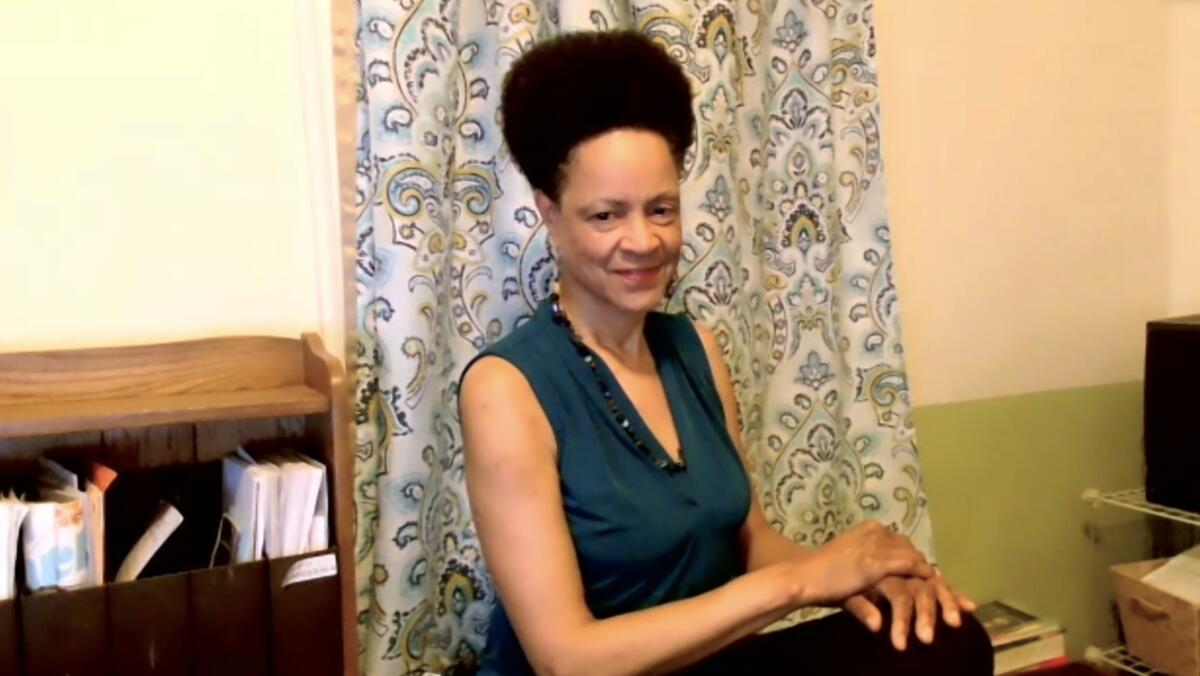
Still, I’ve come to understand the mash-up of forces driving my sister’s choice: her affinity for natural remedies, her experience in Cleveland, her distrust of government and the medical establishment and, perhaps most important, the support and influence of her cadre of like-minded friends.
In my world, everyone I know was excited by the prospect of a COVID-19 vaccine long before one existed. We considered it the ticket out of isolation and back to normal life.
I remember the flurry of messages that filled my inbox when vaccine sign-ups began, with tips from colleagues and friends on how to navigate the clumsy appointment system and which vaccination venues had the least odious wait times.
On my NextDoor feed, the usual litany of neighborhood complaints suddenly gave way to smiley-face emojis and “VACCINATED!!!” posts. And my friends proudly sported “I’m Vaccinated” stickers, making it feel as much like a civic duty as voting.
But my sister’s experience has been markedly different. Her social media feeds are crowded with conspiracy theories, reminders of the mercenary leanings of Big Pharma, and testimonials from people who say they were harmed by the vaccine.
And then there are the warning videos sent from friends, which flash “no longer available” when she tries to click on them. She can’t help but wonder whether those missing links are “the rantings of charlatans — or the cry of sincere whistleblowers hoping to spare the public from extreme harm.”
Last month my sister’s social network landed her in unfamiliar territory: a crowded gymnasium in a rural Ohio town, filled with maskless white people cheering a Trump acolyte who railed against masks, abortions and open borders.
My sister and the friend who invited her were virtually the only Black people there. It felt “very odd being the only people in the room wearing masks,” she told me. After listening to a speaker disparaging their use, she took her mask off briefly before thinking better of it and putting it back on.
Increasing evidence about the effectiveness of COVID-19 vaccines and California’s low case rates convince experts it’s safe to stop wearing masks.
She’d come to hear the keynote speaker, a physician her friend had long admired for her stance on the value of natural health care and threats posed by medical interventions. That doctor has been traveling the country, urging people to avoid the COVID-19 vaccines.
My sister felt comfortable when a Black doctor led a prayer to open the event. But he was followed by white right-wing politicians, who called themselves patriots.
“I started looking around for the exits then,” she said, chuckling at the memory. “I was like, ‘Which way do I go to get out of here!’”
But once the program began, “we felt welcome,” she said. The doctor’s message aligned with my sister’s mind-set, “and the people were very nice.”
**
I imagine some version of our philosophical disconnect is going on in families and communities across the country, especially as the pool of people eligible for vaccines expands.
Our experience illustrates how deep, untidy and idiosyncratic vaccine resistance may be.
And that’s created a conundrum for government and health officials, who are trying to keep COVID-19 in check by vaccinating as many people as possible as soon as possible — in an era when “Just trust science!” isn’t good enough.
More than five months into the inoculation campaign, a vast gulf has opened between the most- and least-vaccinated of California’s 58 counties.
In Long Beach, they’re trying to counter amorphous resistance by giving newly vaccinated people free tickets to the Aquarium of the Pacific and a chance to win a Nintendo Switch gaming console — a ploy intended to persuade unvaccinated young men to roll up their sleeves. In Los Angeles, those getting vaccinated have a chance to win Lakers season tickets.
In Cleveland, dropping your resistance to the vaccine can make you a millionaire. The state of Ohio is using federal coronavirus relief funds to pay for five weekly lotteries that will each net one newly vaccinated winner a million-dollar prize.
And California announced on Thursday a grab bag of incentives, including grocery gift cards to those who complete their inoculations, and the chance for 10 vaccinated residents to win $1.5 million apiece.
Ferrer thinks the offerings might attract some people who have been procrastinating, “but it’s not going to move the needle with those who are really resistant.”
My sister is one of those who won’t be incentivized. “I could not trade my convictions on how to stay healthy for a million dollars,” she insists.
It’s not that she’s a hard-core anti-vaxxer. “I know I probably had [vaccines] as a child that allowed me to grow to where I am today and to be healthy,” she acknowledges. She is the only one of my three siblings who has not been vaccinated against COVID-19.
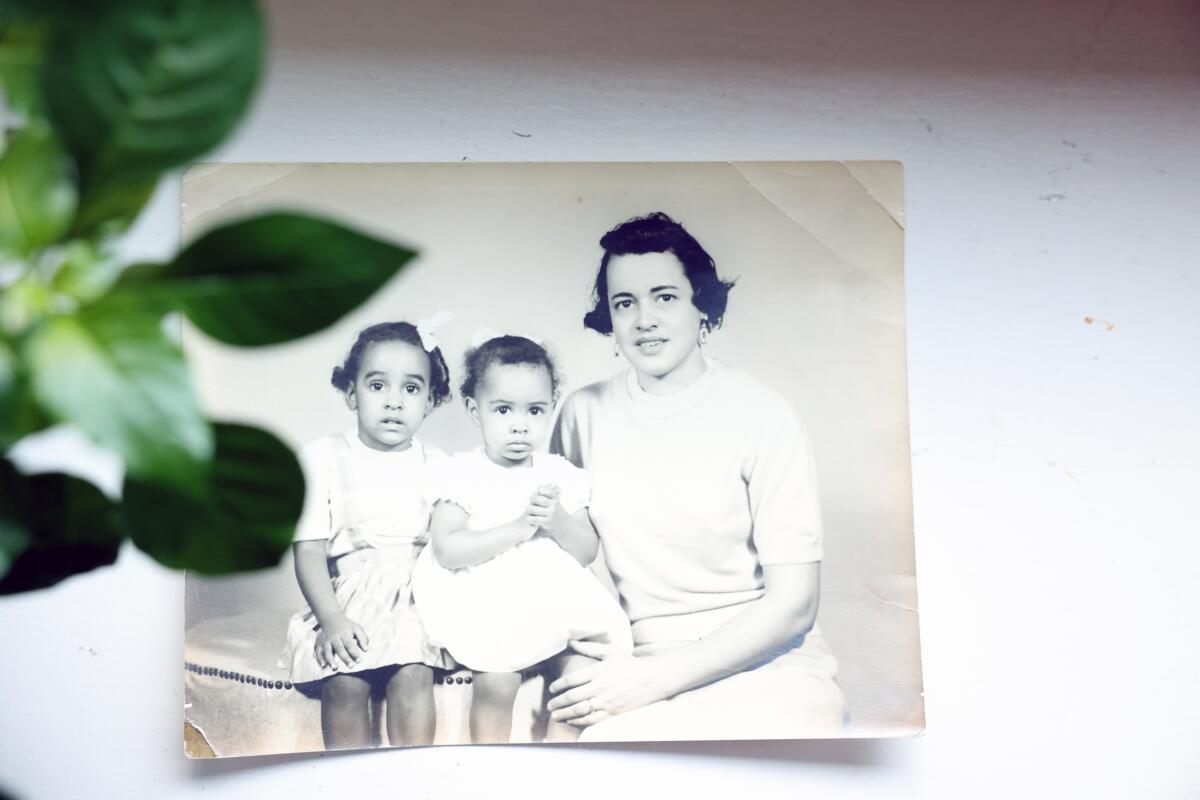
But to her, these vaccines feel rushed into being. And she won’t be pressured into taking the needle before she’s completed her research — even though many of us might consider her sources questionable.
She’s tuned to a steady stream of “videos of doctors and nurses of every race” who believe the vaccines have not been tested enough. “They talk about alarming potential long-term effects,” she said, “and it sounds like there may be some plausibility.”
In that, I see her process as being not so different from mine: we’re both gravitating toward analyses that confirm our existing beliefs. Psychologists call that “confirmation bias”; it’s a coping mechanism by anxious brains, desperate to turn ambiguity into truth.
I’ve come to realize that an atmosphere this intense can magnify the influence of what you read, hear or see. I had to acknowledge that when, a few weeks ago, I suddenly began to imagine that every new ache or pain I felt might be a side effect from the shot I got months ago.
If I could be primed so easily by our conversations to blame my maladies on a vaccine I trust, imagine how strong my sister’s mind-set must be, after months of wading through all manner of warnings about COVID-19 vaccines.
So we’ve finally reached a truce: she won’t send me scary videos demonizing the vaccines, and I won’t try to debunk what I consider crazy stuff.
I understand that her choice is not something for Big Sister to “fix.” And I’m heartened that despite how pushy I’ve been, she is still willing to listen to me.
“I do not want to send any info you do not want to receive, but please send me any you think may be of interest,” she wrote.
“Good to know you have researched this subject; I hope your conclusions are more right than mine! — because many are receiving the vaccine, including others I care deeply about.”
More to Read
Start your day right
Sign up for Essential California for news, features and recommendations from the L.A. Times and beyond in your inbox six days a week.
You may occasionally receive promotional content from the Los Angeles Times.
